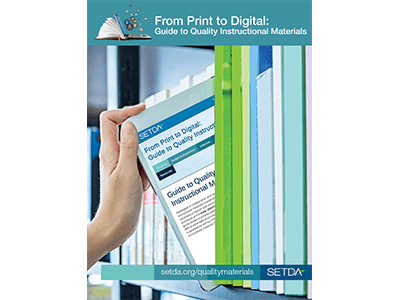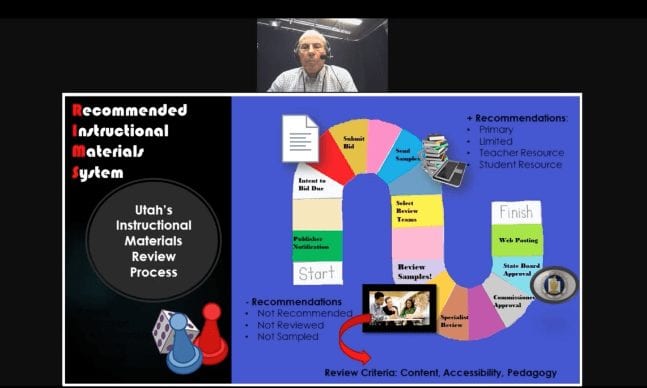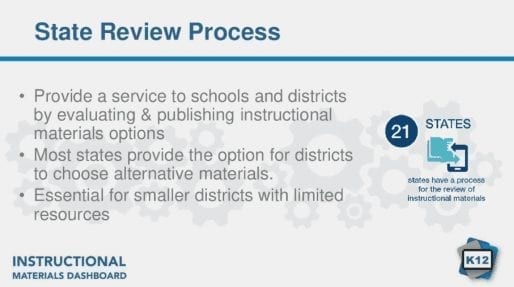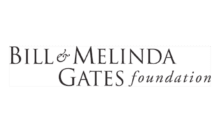Access State-Reviewed Instructional Materials with SETDA’s Dashboard
Now education decision makers across America can see detailed reviews compiled in multiple states, to facilitate the evaluation and purchase of print and digital materials for students and teachers.
A pilot program of the State Educational Technology Directors Association (SETDA) has made 12 states’ reviews of secondary math and language arts materials available, with a wide range of K-12 resources from these and other states to follow. As explained by Christine Fox, Deputy Executive Director of SETDA, during a recent edWebinar, this searchable information will help educational leaders ensure that the materials they purchase are high-quality, aligned with their standards and goals, and accessible to all students.
While many states publish their reviews on their own state websites, the new SETDA dashboard enables educational leaders to use a single search to access evaluations made by multiple states, and to quickly find vetted resources for a specific subject or grade range, such as algebra 1 or 10th grade language arts. This variety of resources, review processes, and perspectives can help educational leaders make better and faster decisions about purchases of materials.
Dashboard Views and Options
The new SETDA dashboard features different ways to sort content, so educators can look at a specific state, publisher, or title, or see a wider range of resources across different states and from different publishers. The range of materials includes open educational resources, as well as copyrighted print and digital resources from publishers, and the dashboard includes options to reset and clear searches, and to download entire data sets into a spreadsheet.
After finding a review they want to consider, educators can then focus in on the evaluation, comments, and recommendation regarding the educational material, and in many cases compare that review to a different state’s review of the same resource. In addition to obtaining diverse perspectives on resources, educational leaders can also consider the different review processes and how those examples may help them improve their own review processes in the future.
Utah’s Process and Reviews
Alan Griffin, a Utah State Office of Education curriculum specialist, provided a closer look at the type of reviews available through the SETDA dashboard, and how the reviews are conducted.
Utah has a long-established review process for educational materials and publishes its reviews so educational leaders can consider vetted educational materials and make a good initial decision about how to proceed with their purchases. This service also lets the districts and schools do less work on their own during their purchasing processes.
The state review process begins with a notification to publishers about the upcoming review, and then publishers first submit an intent to bid, followed by a bid with specific information and free samples. A state board of specialists then sets up a review team comprised of specialists and educators from different parts of the state.
The reviewers look at three key aspects of the material—the content and especially its alignment to core standards, accessibility of the content for all students, and the pedagogy, including teacher support and assessments. A rubric helps the reviewers evaluate the materials, and the reviewers are required to provide notes explaining the reasons for their evaluations.
The Utah review process results in four different types of recommendations, depending on the type of material submitted, or three different ways in which materials may not be recommended. And now the recommendations are accessible, along with details from the review process, through the SETDA dashboard.
By providing reviews and recommendations from multiple states about many different types of resources, the new SETDA dashboard makes the selection of high-quality educational materials a faster, easier and much more inclusive process.
This edWeb webinar referenced above was hosted by SETDA and sponsored by Bill and Melinda Gates Foundation.
This article was modified and published by EdScoop.
About the Presenters
Christine Fox is the deputy executive director for SETDA. As Deputy Executive Director, she collaborates with the executive director in charting strategic direction, administration, planning and financial decisions involving SETDA. She also facilitates the members’ professional learning opportunities including planning and implementing the content for SETDA’s virtual and in-person events and newsletters. In addition, she manages many of SETDA’s research and product development projects from conception to publication. The management of such projects includes coordinating data collection from all states, supervising consultants and staff, ensuring member input and supervising the publishing process. Recent publications and projects include Navigating the Digital Shift, Digital Instructional Materials Acquisition Policies for States, OER Case Studies: Implementation in Action, The Broadband Imperative and From Data to Information. Christine’s background includes experience in education and consulting. She has worked as an educational consultant and curriculum developer for a national whole school reform model, ESOL coordinator and 3rd grade teacher. Christine has a Masters of Science in teaching English as a second language from Florida International University and received her bachelor’s degree in English literature from Florida State University.
Alan Griffin has been an educator in Utah for the past 44 years. He is currently the curriculum content specialist at the Utah State Office of Education (USOE). He has taught in many areas of social studies, as well as in computer applications and programming. Mr. Griffin has served on the executive boards of the Utah Commission of Volunteers, the Utah Coalition for Civic, Character, and Service Learning, and the Utah 3Rs organization. He has served as the State Education Agency coordinator for Learn and Serve grants awarded in the state. He has presented at numerous state and national conferences on service learning, life skills, and evaluating instructional materials. He has also been heavily involved in technology, serving as the technology coordinator in the Weber District for 11 years, and presently provides technology support for the teaching and learning staff at USOE. He is currently a member and former President of the State Instructional Materials Review Association (SIMRA), a national organization that collaborates regarding curriculum evaluation processes. He and his wife Billie are the parents of 11 children and live in West Haven, Utah.
Join the Community
Essential Elements for Digital Content is a free professional learning community on edWeb.net that provides policy makers, school administrators and educator leaders a better understanding of policies and practices related to digital instructional materials.







Comments are closed.